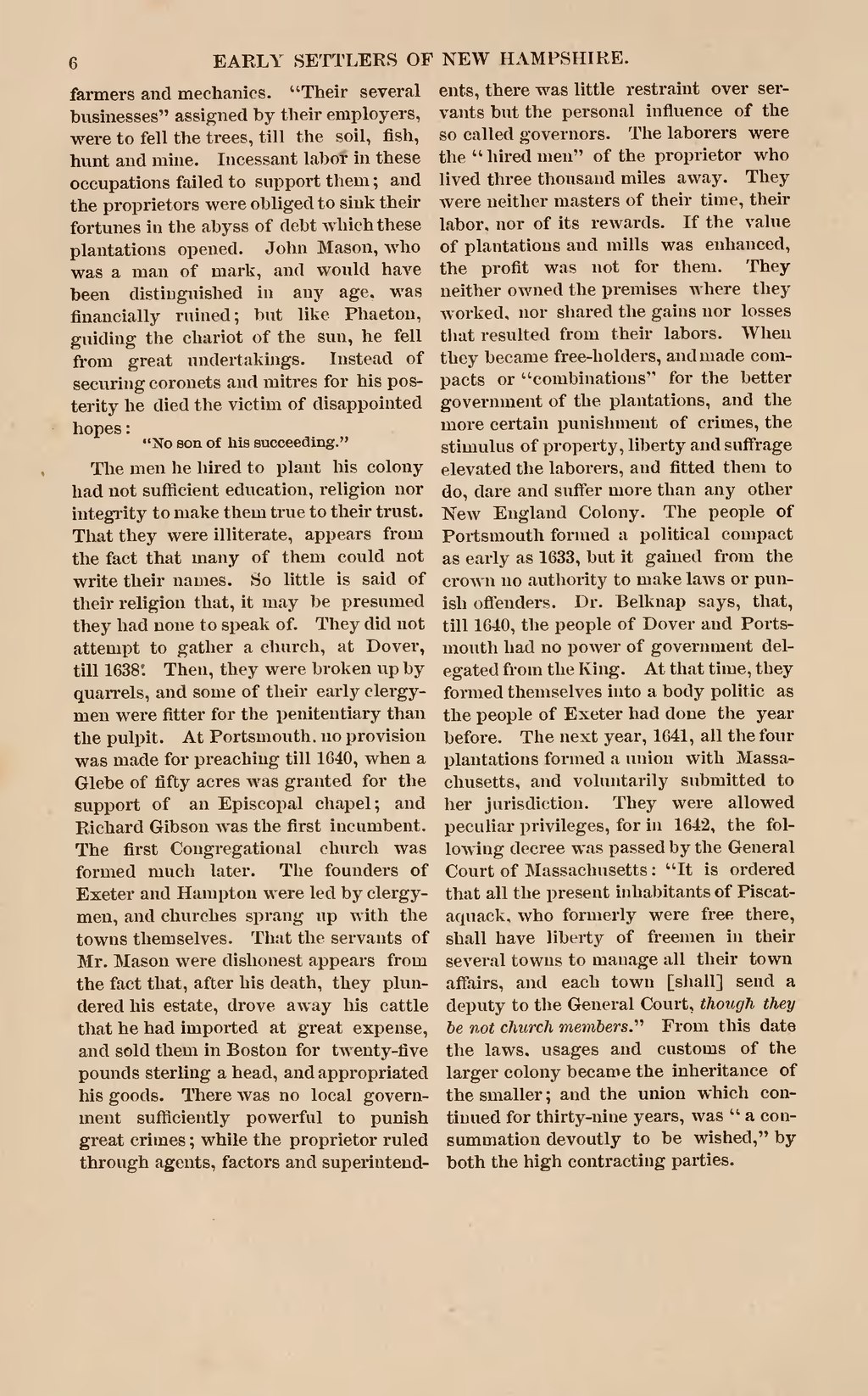farmers and mechanics. "Their several businesses" assigned by their employers, were to fell the trees, till the soil, fish, hunt and mine. Incessant labor in these occupations failed to support them; and the proprietors were obliged to sink their fortunes in the abyss of debt which these plantations opened. John Mason, who was a man of mark, and would have been distinguished in any age. was financially ruined; but like Phaeton, guiding the chariot of the sun, he fell from great undertakings. Instead of securing coronets and mitres for his posterity he died the victim of disappointed hopes:
The men he hired to plant his colony had not sufficient education, religion nor integrity to make them true to their trust. That they were illiterate, appears from the fact that many of them could not write their names. So little is said of their religion that, it may be presumed they had none to speak of. They did not attempt to gather a church, at Dover, till 1638:. Then, they were broken up by quarrels, and some of their early clergymen were fitter for the penitentiary than the pulpit. At Portsmouth, no provision was made for preaching till 1640, when a Glebe of fifty acres was granted for the support of an Episcopal chapel; and Richard Gibson was the first incumbent. The first Congregational church was formed much later. The founders of Exeter and Hampton were led by clergymen, and churches sprang up with the towns themselves. That the servants of Mr. Mason were dishonest appears from the fact that, after his death, they plundered his estate, drove away his cattle that he had imported at great expense, and sold them in Boston for twenty-five pounds sterling a head, and appropriated his goods. There was no local government sufficiently powerful to punish great crimes; while the proprietor ruled through agents, factors and superintendents, there was little restraint over servants but the personal influence of the so called governors. The laborers were the "hired men" of the proprietor who lived three thousand miles away. They were neither masters of their time, their labor, nor of its rewards. If the value of plantations and mills was enhanced, the profit was not for them. They neither owned the premises where they worked, nor shared the gains nor losses that resulted from their labors. When they became free-holders, and made compacts or "combinations" for the better government of the plantations, and the more certain punishment of crimes, the stimulus of property, liberty and suffrage elevated the laborers, and fitted them to do, dare and suffer more than any other New England Colony. The people of Portsmouth formed a political compact as early as 1633, but it gained from the crown no authority to make laws or punish offenders. Dr. Belknap says, that, till 1640, the people of Dover and Portsmouth had no power of government delegated from the King. At that time, they formed themselves into a body politic as the people of Exeter had done the year before. The next year, 1641, all the four plantations formed a union with Massachusetts, and voluntarily submitted to her jurisdiction. They were allowed peculiar privileges, for in 1642, the following decree was passed by the General Court of Massachusetts : "It is ordered that all the present inhabitants of Piscataquack, who formerly were free there, shall have liberty of freemen in their several towns to manage all their town affairs, and each town [shall] send a deputy to the General Court, though they be not church members." From this date the laws, usages and customs of the larger colony became the inheritance of the smaller; and the union which continued for thirty-nine years, was "a consummation devoutly to be wished," by both the high contracting parties.
